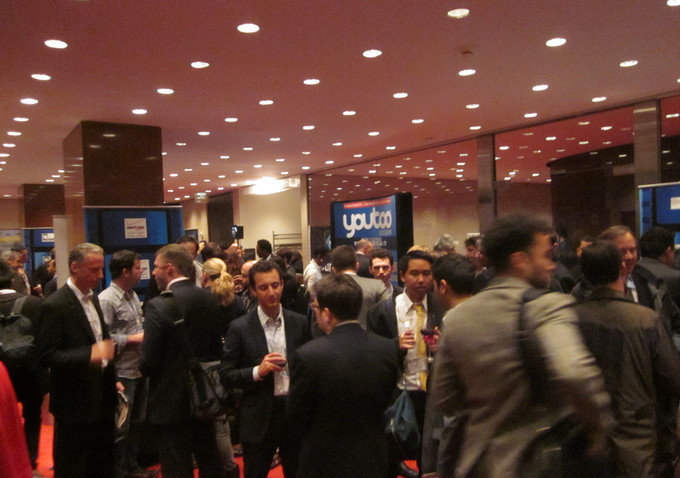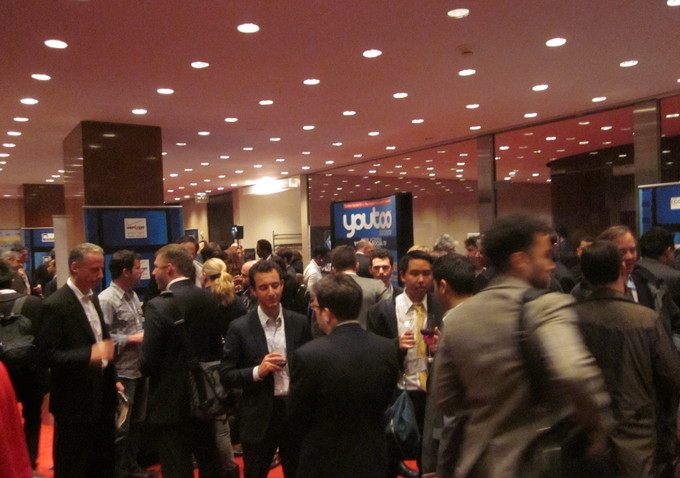By Jacques Thelemaque
Conferences abound in the US Film Biz and sometimes seems like another example of industries that still financially prosper in a field that has regularly been headed downwards. Yet, as corporate focused as they often are, they do point to a tendency to continued education. Perhaps most hopefully they point to a willingness for our industry to evolve and embrace some aspect of change. We sent Filmmakers Alliance founder and past HopeForFilm contributor Jacques Thelemaque to Digital Hollywood NYC to get the perspective for the truly free film community.
— Ted
I don't go to seminars and conferences as often as I used to. Mostly because getting anything beyond a sales pitch out of them is like panning for gold. I've lost patience with sitting through hours of presentations to get a single nugget of new/good information. There are exceptions, however (such as Ted and Christine Vachon's excellent master class which I will post a blog about soon), so I was genuinely excited for the opportunity to attend Digital Hollywood NYC last week.

Frankly, I'm excited by anything that will help me try to understand the new media landscape, which I find frustratingly inscrutable. And given that the two-day conference is titled "Digital Hollywood" (with a subtitle of "Content is King") the natural assumption is that it is looking at the digital landscape from a filmmaking/entertainment/story-telling perspective, which is right in my wheelhouse.
So, I hopped a couple of trains and made it up to the McGraw-Hill building in mid-town Manhattan to see what I could learn. No signage, but lots of helpful people led me to the second floor balcony and suite of classrooms. I got there a bit early and was immediately encouraged by the fresh coffee and buffet of baked goods. No matter what happened, I wouldn't have to experience it on an empty stomach.
I also was happy to learn they offered wifi access, so I pulled up the conference schedule on my computer. Since they always had at least three panels going on simultaneously, you would have to choose one – or hop around getting bits and pieces, which they encourage you to do. It was tough choosing as they were able to get a number of impressive speakers – many CEO's and V.P.'s of both emerging and established companies working, in various ways, at the convergence of digital entertainment and social media.
For the first panel of the conference, I chose one on Social TV. There was also one on philanthropy in the digital age sponsored by Huffington Post that was tugging at me, but I chose Social TV because I felt I really needed to understand what the hell it was. The minute it started, however, I realized I'd be playing catch-up. The audience was clearly expected to already understand the term "Social TV" as well as the buzz-words that flew around the discussion. Here were the four most common buzzwords I heard there, and actually, throughout the conference:
Second screen (even third screen, sometimes) – The computer, tablet or smartphone you are looking at even while you are primarily engaged in some other screen (presumably the television).
Ecosystem – The digital world created by a specific film, tv/internet show, game or product.
Engagement – The connection between an audience and a specific film, tv/internet show, game or product created or enhanced through digital tools and websites.
Metrics – The data related to a specific film, tv/internet show, game, or product. How many eyeballs is it getting? How much activity is it generating? How much money is it making? Etc., etc….
As I sat through the discussion, it became clear to me that, at least in the context of this conference, Social TV seems to be a catch-all term for any tools/technologies that generate social interactions based upon media creation and consumption. It's all the stuff companies are devising to get and keep audiences engaged.
Now, none of this is all that sexy for an old-school film buff like me. But I felt like a six year-old eating my vegetables. It was necessary information I had to swallow. We need to learn about all this stuff and see if it will lead us filmmaking dinosaurs anywhere other than extinction. It turned out, however, that to swallow it, I also needed to interpret it. At this first seminar, as would be the case with nearly all the seminars throughout the conference, there was precious little specific discussion about content. Most speakers spoke in vague generalities about "content" and rarely did anyone discuss Social tools in direct relation to independent film – aside from a specific case-study panel on an Academy Award-nominated doc. The conference, over-all, was heavily slanted toward the television and advertising industries. That doesn't automatically mean there weren't meaningful analogies contained therein for independent filmmakers. But they weren't always obvious. And sometimes, the industry focus was far too tedious to sift through in hopes of finding that small nugget of informational gold.

So, getting back to the Social TV panel, the combination of buzzwords, vagaries, and corporate agendas finally overwhelmed me and I skipped over to the philanthropy panel before it ended. It was mostly doc filmmakers talking about the globally-impacting work they were doing…and it felt like a breath of fresh air. But the disconnect between what they were discussing and the Social TV panel was striking. Yes, what these doc filmmakers were discussing was far more meaningful and interesting, but they did not seem to even consider employing the kind of audience engagement arsenal that the corporate types were obsessed with just down the hall. I asked filmmaker Laura Pohl how much she integrates transmedia concepts and strategies into her work. She said not at all. At least not on the project she was discussing.
But that is not too surprising because filmmakers in general are still pretty old-school. And, after sitting through most of the Social TV panel, I still had no real idea what the Social TV arsenal is comprised of. So, I returned to the Social TV panel just in time for Q&A and asked some specific questions.
Question: "What tools and techniques do you employ in your Social TV strategies"? Answer: "Well, we use Twitter and Facebook. We invite commentary. We create apps and games and other interactive content. We sometimes run contests. In general, we invest heavily in second, and sometimes third, screen activity…." Uh, okay. Nothing too cutting-edge here, obviously, but I get the idea. Just create as much stuff as possible that will broaden your audience base and/or keep it engaged. What that is specifically is clearly still evolving, and will necessarily be different for different kinds of shows. But between the two panels I came away feeling that all of the things these corporations are doing to sell shows and products can be used extremely effectively by the documentary world to engage people in causes, guide them to action-steps and effect global change.
I also asked Sara Passe of CAA (who works with new media creators and producers): "What kind of projects should indie filmmakers be thinking about in terms of new media/Social TV?" Answer: "The short answer is that it must be globally monetizable and easy to market. It should also provide some clear mechanism for audience engagement. I know it may be counter to what indie filmmakers want to do, but they should focus on creating films that can be cut up into bite-sized pieces – essentially serialized. Does that help? I hope so." Well, sorta.
I wondered why a representative from Sharp (the television manufacturer) was on the panel so I asked her what kind of relationship her company was looking to have with content creators. Her answer: none. She just thinks this Social TV space is really important and we should all be working to understand it. So, we're essentially in the same boat.
From there, I skipped around from "Merging Content with new Technologies" To "Video Across Platforms" to "The Social Experience: Personalized communication" to "Digital Media Investing" to "Transmedia Showcase" to "Cable TV and Broadband: New Content" to "Video on Smartphone and Tablet". Of course, I took a small break in between all this to chow down on the nice sandwiches and cookies they provided. So, here's what I took away from the rest of the day:
Nobody knows anything. Or, at least, nobody has any certainty about where all of this digital potential is leading.
Nobody has yet to hit on a great, consistent model for monetizing new media other than to start a "digital media" venture, get some VC to fund it and pay yourself a lot of money. There are people making small bits of money with web/tablet/smartphone-specific content, but no clear formula for how they've done it.
Nobody seems to talk specifically about content. Content did not seem like King. More like an indentured servant.
The killer spin-off "app" of all time is fantasy football in that it brings in a secondary, but very compelling level of engagement with the main show. Is there a film analogy to that?
If given the opportunity, audiences will sometimes create their own, often surprising ways to engage with content. Give audiences opportunities to respond to your work and then pay attention to those responses.
Although the Investment panel was just for tech/media entrepreneurs, the key ingredients investors want is also applicable to film – What is the product (what is the film and is the script/concept any good)? What is the market (who will want to buy/see the film)? And what is the team (who are the filmmakers)?
The transmedia panel actually had filmmakers (content creators, as they were called) successfully creating alternative work. But none had an economic formula for what they do. None had a repeatable business model of any kind. They just created work (ALL short form) and were found by audiences (or media companies).
The day finished with a very nice wine reception that allowed me to connect with a couple of interesting attendees, especially one guy from Germany working on a very cool next generation collaborative filter that could work incredibly well for films. Few of the panelists were anywhere to be found. Neither was dinner, even though it was listed in the program. But there were yummy leftover cookies. I pocketed a few on the way out so that I would end Day
Day Two had a bit more film-related stuff. I'll give you the lowdown and wrap-up in Part 2.





